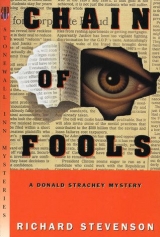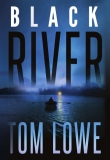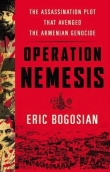
Текст книги "Chain of Fools "
Автор книги: Richard Stevenson
сообщить о нарушении
Текущая страница: 12 (всего у книги 12 страниц)
Chester did admit that he had brought Tacker Puderbaugh back from Tahiti to "play some pranks" on the pro-Griscomb Osbornes. But Tacker and a friend of his from Lake George had "gone too far," Chester said, when they committed arson and then demanded that Chester pay them $150,000 in hush money so that they could open a surfboard rental business on Okinawa.
Both Tacker and his friend were picked up at the friend's house and charged with arson and attempted murder. Janet identified Tacker's friend as the man who attacked her—and later attacked her, Dale, Timmy, and me—on a Jet Ski. At first, Timmy wanted to charge the Jet
Ski maniac with assault too for breaking his foot, but after thinking it over decided to let it go.
For the moment, Chester escaped being slapped behind bars—the DA was considering what charges to bring against him—and Chester's dodging a murder rap was the one disappointment suffered by full-dentured Bill Stankie. Stankie did get to see Torkildson and Tacker occupy adjoining cells (having admitted complicity in the jewel robbery, Dan was released on bond), and Stankie took satisfaction in Tacker's determination to incriminate Chester to the utmost extent. Stankie and the DA were also interested—as was I—in Tacker's assertion that "Mummy"—i.e., June—knew all about Tacker's campaign of terrorism against the pro-Griscomb Osbornes.
When she was informed of all these developments Saturday night, Ruth Osborne seemed unsurprised to learn that Dan, Chester, Tacker, and possibly even June had been involved in criminal activities that grew out of the battle for the soul of the Herald. "The Osbornes have always tended toward ruthlessness in support of their causes," she said. But the news of Stu Torkildson's arrest for Eric's murder was even more deeply shocking. Mrs. Osborne began to tremble when Janet told her, and she went up to her room soon after.
"The family always relied on Stu," Janet told Timmy, Dale, and me on the Osborne back porch later that night. "Stu was the man Dad depended on to keep us all both solvent and honest. So to Mom what itu did must feel like the ultimate betrayal."
"Was the ultimate betrayal," Dale said, and we all agreed solemnly with that.
Both Janet and Dale were exhausted from working to salvage belongings from the half of the lake house that remained standing after the fire that Tacker set, and from the shocks of the previous thirty-six hours. They weren't too tired, however, to speculate on the upcoming family board of directors' vote.
"The outcome," Janet said, "is going to depend on which board members are behind bars on September eighth, and which ones will be available to vote. If Dan is still out on bail, that should seal it for Griscomb. If Chester is unable to vote and Tidy comes on to the board, that won't change anything one way or another."
"And certainly your mother should survive the mental competency hearing on Monday," Timmy said. "She's understandably devastated by
all this rotten stuff coming out about the family and the fight over the paper. But at this point, anyway, I don't think anybody can deny that her faculties are intact."
"It's also to Ruth's credit," Dale said, "that she hasn't been arrested."
Janet tried to smile but couldn't. "That does seem to be a rarity among Osbornes these days." Janet had spent two hours earlier in the evening giving interviews to reporters from The New York Times and the Boston Globe, who were preparing big stories on the dissolution of one of the great families of American journalism.
"Have either of you ever been arrested?" Dale asked Timmy and me. It seemed an odd question to ask, but Dale's tight look and bright eyes suggested she had something in mind.
I said, "I've been manhandled a few times in the line of duty by the Albany criminal justice establishment, Dale, and I wear every scar from those encounters as a badge of—not honor, I guess. Bemusement would be more like it, mixed with disgust."
"And what about you, Timmy?" Dale said. "Have you ever been arrested?"
His fiberglass-encased foot bobbed once, his face went white, and sweat popped out on his forehead. Timmy stared at Dale and said, "No. I've never been arrested."
"But I have," she said with a look of triumphant contempt. "Haven't I, Timmy?"
He said, "Oh, hell. You were in that ACT-UP group Oh, hell."
"Yes, I was in that ACT-UP group, oh, hell. In April 1987. I see it all is starting to ring a bell now somewhere deep inside your big, adorable head. Bong, bong, bong."
"Jeez. I felt bad about that. It was after the Health and Human Resources Committee vote on AIDS home-care funding, right?"
"Right you are, Tim."
"And your group thought Assemblyman Lipschutz shouldn't have compromised so much with the Republicans on the budget. You all came over to the office and wouldn't leave—there were forty or fifty of you, as I recall—and you demanded to see Myron."
"Asked nicely to talk to him," Dale said. "Forcefully but nicely."
"No, you demanded to talk to him. Except, as I remember it, he was off in a meeting somewhere with the Speaker."
"That's what you told us at the time. That was all bullshit, of course."
"And you refused to leave the office. Your whole group sat down on the floor, and you said you weren't leaving until Myron heard what you had to say. You were the spokesperson for the group. That's when I left. I went over to the Speaker's office to see if I could pry Myron out of the meeting."
"Uh-huh. So you said."
"And while I was over there, the Capitol Police got word that you were sitting in Myron's office—"
"You called them, Timothy! Admit it! You told us we could meet with Assemblyman Lipshutz, and then you went out and called the cops, and we all got arrested. We spent the night in the lockup while you were probably down at the bar at Le Briquet having a good laugh over how you put one over on the dyke and faggot riffraff."
"Dale," Timmy said, "you are wrong, wrong, wrong—as you are every once in a great while You are as sharp as they come, Dale, but you don't know me. Or Myron Lipshutz. It was Assemblyman Metcalfe, across the corridor, who called the cops on you, and both Myron and I were furious when we came back to the office fifteen minutes later and found out what had happened. It was Myron who got you all a lawyer from Lambda Legal Defense, and it was Myron who, a week later, got another twelve million transferred to AIDS home care from the health administration budget. So if that incident is the cause of your attitude toward me, an adjustment is in order. An apology, I'm sure, is much too much to hope for."
Janet and I each had a swig of beer and watched as Dale carefully considered this. Finally, she said, "How come we never heard this version of events at the time?"
"Because," Timmy said, relaxed and enjoying himself now, "Myron knew he'd never get the extra twelve million if it looked like he was in bed with extortionists. He wanted results, not a lot of—'diarrhea' was Saul Alinsky's term for righteous public explosions that make the demonstrators feel better but achieve nothing lasting. And Myron got results "
Dale sniffed. "The twelve million was a drop in the bucket, speaking of diarrhea. Anyway, without ACT-UP there to remind the legislature of the huge, crying need, the appropriation would have been half what it was."
"That is correct," Timmy said. "ACT-UP and other better-behaved
groups—each group in its own way—got their points across. They made a big difference."
Dale seemed to relax a bit. She gulped some beer down, then said to Timmy, "Okay, Timothy, my man. You passed the test. You're it."
"Gee whiz, thanks."
" 'Gee whiz.' There's another one of those old-timey exclamations you like to use that we hardly ever hear anymore. Sort of like 'golly gee.' Or 'gee willikers.' I don't suppose, though, that there would be a genetic predisposition to those funny expressions in any of your progeny. So, Timothy, you're it."
Timmy shifted uneasily on his chaise. "What do you mean, 'it'?"
"Janet and I decided several months ago to have a child I'll be the biological mother. We need a sperm donor, and with Janet's endorsement I've been testing you to see what you're made of. You've passed the test. We need to get to it soon, if you're healthy and it's okay with you, because my clock's running out. And let's not fool around with turkey basters, either. That's so cold and clinical for such an intimate– sacred really—ritual of creation. So Whaddya say, Tim, old man? Are you up to it? Ready for some fructification?"
Timmy stared at Dale, and even though it wasn't, his look was that of a man whose hair was standing on end.
Later that night, in June's four-poster, Timmy said, "I hope you're not hurt that they didn't ask you, Don "
I said, "No, their reasons for chosing you are perfectly valid. They think you would be the more loyal and loving and attentive father– or father figure, as Dale insists on calling it—and they're right. If they had asked me, I'd have said no thanks, I've never had the urge. But you knew right away it was something you'd missed in life, and you wanted deeply to do it, even though you'd never realized it before."
"That's right."
"But I'll be interested to be the father-figure-in-law-once-removed, or whatever you call it."
"I know you will."
"I don't know about those names they've picked, though. Shira Osborne-Kotlowicz? Yussie Osborne-Kotlowicz?"
"That's up to them. The names sound fine to me."
"You're not going to press for Sean Callahan-Kotlowicz-Osborne? Or Heather Kotlowicz-Osborne-Callahan?"
"No, I don't care what the name is. I'm just—exhilarated is the only word for it—at the idea of creating a human being that's part of me and yet will have a life—a life!—that's all its own."
"I understand that, Timothy. It's not what I want, somehow, but I hear you, and I love it that you're thrilled."
"I am relieved, though, that Dale relented and is willing to use indirect means for the impregnation. I guess I could have managed it, but—really. Geez."
"She's still threatening to jump you some night, though. And, hey, you might be surprised. There might be another revelation in store."
"I have a feeling," Timmy said, "that I would have figured that one out earlier in life. It isn't as though I wasn't encouraged to do so."
"Just think," I said, "you're going to make a human life, and the whole story of that life started with Skeeter back in high school in Poughkeepsie. I'll bet he'll be happy when he hears about it, and even proud."
Timmy became thoughtful at the mention of Skeeter. After a moment, he said, "Maybe Eldon would make a good name for a baby."
"Yeah," I said. "Or Eldona."
We talked for a long time under June's canopy, and decided that one day Eldon or Eldona would be editor of a great newspaper, or– if great newspapers didn't exist anymore in the twenty-first century– a series of feisty pamphlets passed from hand to hand.
Epilogue
Dan Osborne plea-bargained a sentence of one year for his role in the jewel robbery. Tacker Puderbaugh and his Jet Ski-riding accomplice in the arson and the other intimidating "pranks" were convicted and drew sentences of twelve to fifteen years. Chester, charged with conspiracy to commit mayhem, copped a plea and escaped with probation. June got off free too, although the county art museum suspended her for one year as the curator of the annual canoes-at-sunrise show. Parson and Evangeline Bates turned against June and Dick Puderbaugh, and Parson wrote a column in the Herald attacking the "liberal judge with his own agenda" who let June off.
Suddenly preoccupied, Chester Osborne canceled the proceeding to have his wife committed. Pauline soon left Edensburg in her Lexus– with a trunk full of bearer bonds, it was rumored—and moved into a hilltop house with a tennis court in La Jolla, California. Arlene Thurber visited Dan once a week in the year he spent in prison and brought homemade brownies for Dan and some of the other inmates.
Stu Torkildson was convicted on Dan's testimony and the DNA evidence on the camera tripod. I visited him in jail while he was awaiting trial, and I asked him how he could have blundered so stupidly in launching the jewel-heist scheme—or big drug deal, as he had originally proposed, according to Dan. I said I thought the Spruce Haven disaster would have dissuaded Torkildson from doing anything hugely risky ever again.
Torkildson gave me his most ingratiating sneer and said, "The drug deal that was going to save the Herald—which editorializes against the scourge of drugs, what a laugh—wasn't my idea at all. I argued against
it strenuously, Strachey, and if I hadn't given in, against my better judgment, this entire fiasco—Dan's absurd accusation that I murdered Eric, as well as all the rest of it—could have been avoided. I'm not admitting anything in court, mind you. But if I said something to Dan that he construed as my recommending a big drug deal that could save the Herald, I will tell you confidentially that I was urged to do so by another party who was determined at any cost to keep the Herald in the Osborne family."
He watched me with his eyes that gave nothing away, and I said, "All right, who? Who urged you to save the Herald'with a big drug deal, Stu?"
"Ruth Osborne. Who else? Doesn't it just sound like Ruth?"
"No."
"Then you don't know Ruth Watson Osborne."
"What proof have you got?"
He shrugged. "None."
"You're lying. You've got the morals of a virus. You're making this up."
He just grinned and slowly shook his gleaming head.
The judge at Ruth Osborne's mental competency hearing found her "understandably sad" but sane enough to remain on the Herald board of directors After the September eighth vote, however, her mental condition deteriorated rapidly, and three months later she suffered a stroke and, after a -week of hospitalization, moved into an Edensburg nursing home I never told Janet what Stu Torkildson had said about the idea of saving the Herald through a big drug deal having originated with Mrs. Osborne I ran it by Timmy, who just waved it away.
The Herald board voted, three to two, to sell the paper to Harry Griscomb. The deal was consummated within days. Griscomb assumed the Herald's huge debt, so each Osborne shareholder received, after taxes, just $12,114 Janet said hers would help pay for rebuilding the lake house, and adding a nursery. The other shareholders no doubt spent theirs on legal bills.
The following spring two things happened. Erica McCaslin Kotlowicz-Osborne was born on May 30th at Edensburg County Hospital Skeeter was there—his T-cell numbers were ominous but his health was holding steady, and he'd returned to work for the New York State Forest Service. Timmy was there too, pacing in the waiting room
while Skeeter and I played hearts. Janet was present for the delivery– a highly unorthodox arrangement, hospital officials insisted, but they weren't about to tangle with Janet and Dale.
The other event that May was this: Harry Griscomb Newspapers suffered a financial near-collapse and the third generation of Griscombs seized control of the chain and sold it to the new newspaper division at United States Tobacco. Janet was fired a day later, as were two-thirds of the paper's reporters and all the copy editors. Tidy Osborne Puder-baugh was named publisher of the Herald—"to maintain the respected Osborne family traditions," the new owner said—and a new editor was brought in from the Maryville, Missouri, Epworth-Tribune The features and standards that had made the Herald great soon vanished from its pages—but it did gain a bridge column.








